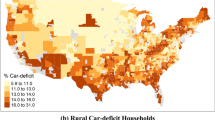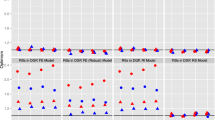Abstract
Individuals processing the information in a stated choice experiment are typically assumed to evaluate each and every attribute offered within and between alternatives, and to choose their most preferred alternative. However, it has always been thought that some attributes are ignored in this process for many reasons, including a coping strategy to handle one’s perception of the complexity of the choice task. Nonetheless, analysts typically proceed to estimate discrete choice models as if all attributes have influenced the outcome to some degree. The cognitive processes used to evaluate trade-offs are complex with boundaries often placed on the task to assist the respondent. These boundaries can include prioritising attributes and ignoring specific attributes. In this paper we investigate the implications of bounding the information processing task by attribute elimination through ignoring one or more attributes. Using a sample of car commuters in Sydney we estimate mixed logit models that assume all attributes are candidate contributors, and models that assume certain attributes are ignored, the latter based on supplementary information provided by respondents. We compare the value of travel time savings under the alternative attribute processing regimes. Assuming that all attributes are not ignored and duly processed, leads to estimates of parameters which produce significantly different willingness to pay (WTP) to that obtained when the exclusion rule is invoked.
Similar content being viewed by others
References
H Aarts A Dijksterhuis (2000) ArticleTitleThe automatic activation of goal-directed behaviour: The case of travel habit Journal of Environmental Psychology 20 75–82
H Aarts B Verplanken A Knippenberg Particlevan (1997) ArticleTitleHabit and information use in travel mode choices Acta Psychologica 96 1–14
T Arentze A Borgers H Timmermans R Del Mistro (2003) ArticleTitleTransport stated choice responses: Effects of task complexity, presentation format and literacy Transportation Research 39E 229–244
DE Berlyne (1960) Conflict, arousal and curiosity McGraw-Hill New York
F Carlsson P Martinsson (2003) ArticleTitleDesign techniques for stated preference methods in health economics Health Economics. 12 281–294
BGC Dellaert JD Brazell JJ Louviere (1999) ArticleTitleThe effect of attribute variation on consumer choice consistency Marketing Letters 10 139–147
JR DeShazo G Fermo (2001) ArticleTitleDesigning choice sets for stated preference methods: The effects of complexity on choice consistency Journal of Environmental Economics and Management 43 IssueID3 360–385
DeShazo JR & Fermo G (2004) Implications of Rationally-Adaptive Pre-choice Behaviour for the Design and Estimation of Choice Models, Working paper, School of Public Policy and Social Research, University of California at Los Angeles.
WH Greene DA Hensher J Rose (2004) Accounting for Heterogeneity in the Variance of Unobserved Effects in Mixed Logit Models New York University: Department of Economics Stern School of Business
RA Heiner (1983) ArticleTitleThe origin of predictable behaviour American Economic Review 73 560–595
Hensher DA (in press) Revealing differences in willingness to pay due to the dimensionality of stated choice designs: An initial assessment. Journal of Environmental and Resource Economics.
DA Hensher (2004) ArticleTitleAccounting for stated choice design dimensionality in willingness to pay for travel time savings Journal of Transport Economics and Policy 38 IssueID3 425–446
Hensher DA (2004a) How do Respondents Handle Stated Choice Experiments? - Information Processing Strategies under Varying Information Load, Institute of Transport Studies, The University of Sydney.
DA Hensher WH Greene (2003) ArticleTitleMixed logit models: State of practice Transportation 30 IssueID2 133–176
Hensher DA, Greene W & Rose J (2003) Deriving Willingness to Pay Estimates from Observation Specific Parameters, Institute of Transport Studies, The University of Sydney.
Hensher DA, Puckett S & Rose J (2004) Agency Decision Making in Freight Distribution Chains: Revealing a Parsimonious Empirical Strategy from Alternative Behavioural Structures, Institute of Transport Studies, The University of Sydney.
L Jacoby (1991) ArticleTitleA process dissociation framework: Separating automatic from intentional uses of memory Journal of Memory and Language 30 IssueID5 513–541 Occurrence Handle10.1016/0749-596X(91)90025-F
L Jacoby (1998) ArticleTitleInvariance in automatic influence of memory: Toward a user’s guide for the process-dissociation procedure Journal of Experimental Psychology 24 IssueID1 3–26
L Jacoby J Toth A Yonelinas J Debner (1994) ArticleTitleThe relationship between conscious and unconscious influences: Independence or redundancy Journal of Experimental Psychology 123 IssueID2 216–219
Kamakura WA Kim B-D Lee J (1996) ArticleTitleModelling preference and structural heterogeneity in consumer choice Marketing Science 15 IssueID2 152–172
BE Khan (1995) ArticleTitleConsumer variety-seeking among goods and services: An integrative review Journal of Retailing and Consumer Services 2 IssueID3 139–148
J Louviere R Carson A Ainslie T Cameron JR DeShazo D Hensher R Kohn T Marley D Street (2002) ArticleTitleDissecting the Random Component of Utility, Workshop Report for the Asilomar Invitational Choice Symposium California; Marketing Letters 13 IssueID3 163–176
NK Malhotra (1982) ArticleTitleInformation load and consumer decision making Journal of Consumer Research 8 419–430
T Ohler A Li J Louviere J Swait (2000) ArticleTitleAttribute range effects in binary response tasks Marketing Letters 11 IssueID3 249–260
D Revelt K Train (1998) ArticleTitleMixed logit with repeated choices: Households’ choices of appliance efficiency level Review of Economics and Statistics LXXX 40 647–657
Rose J, Hensher DA, Greene WH & Black IR (2004) Accounting for Exogenous Information on Decision Maker Processing Strategies in Models of Discrete Choice: Attribute Exclusion Strategies, Institute of Transport Studies, The University of Sydney.
J Swait W Adamowicz (2001a) ArticleTitleThe influence of task complexity on consumer choice: A latent class model of decision strategy switching Journal of Consumer Research 28 135–148
J Swait W Adamowicz (2001b) ArticleTitleChoice environment, market complexity, and consumer behavior: A theoretical and empirical approach for incorporating decision complexity into models of consumer choice Organizational Behavior and Human Decision Processes 49 1–27
K Train (2003) Discrete Choice Methods with Simulation Cambridge University Press Cambridge
White PJ, Johnson RD & Louviere JJ (1998) The Effect of Attribute Range and Variance on Weighted Estimates, Unpublished paper, Department of Marketing, The University of Sydney.
Author information
Authors and Affiliations
Corresponding author
Rights and permissions
About this article
Cite this article
Hensher, D.A., Rose, J. & Greene, W.H. The implications on willingness to pay of respondents ignoring specific attributes. Transportation 32, 203–222 (2005). https://doi.org/10.1007/s11116-004-7613-8
Issue Date:
DOI: https://doi.org/10.1007/s11116-004-7613-8




